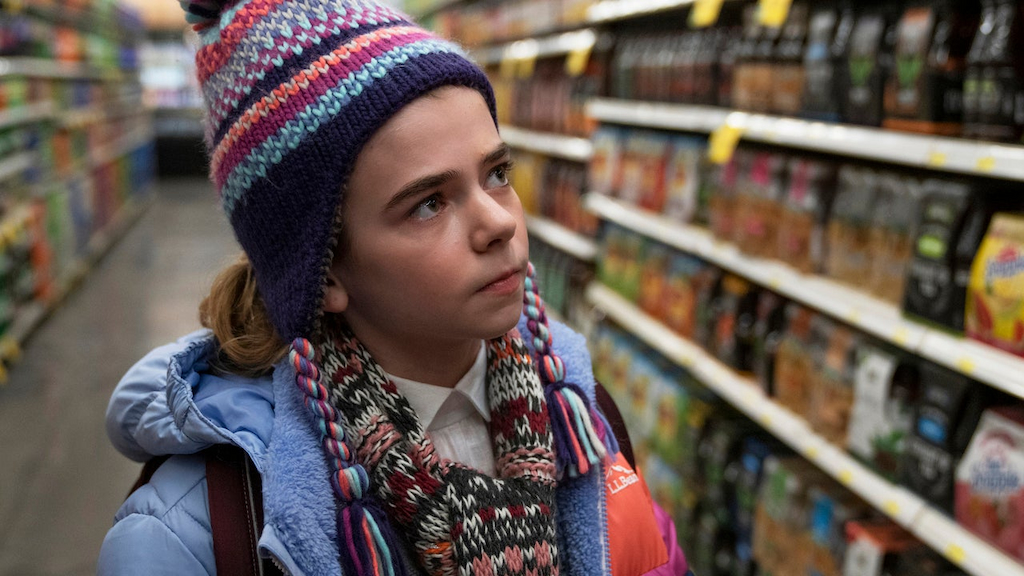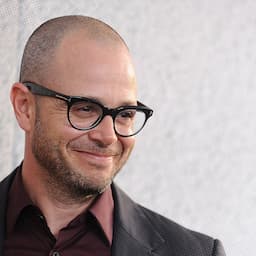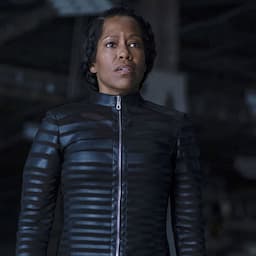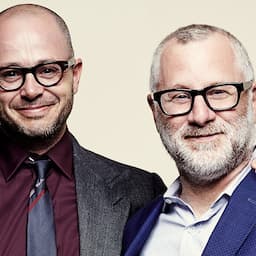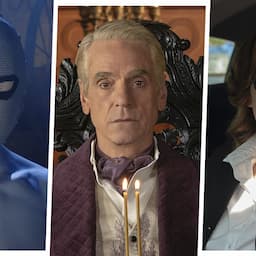The limited drama based on the novel by Emily St. John Mandel tells the overlapping stories of survivors of a deadly flu.
Station Eleven, which follows the lives of people trying to rebuild 20 years after society as we know it was wiped out, is easily one of the best shows of 2021 – and a must-watch despite its initial setup: a deadly flu. Adapted from the novel by Emily St. John Mandel, the limited series has more in common with The Leftovers and Watchmen than it does with Contagion or any other pandemic-themed films or series.
“It’s a show about a small group of interconnected people before, during, and after a pandemic,” showrunner Patrick Somerville tells ET, explaining that the “fault line at its center is this major catastrophe.”
While the first episode opens with a handful of characters, including Jeevan (Himesh Patel) and Kirsten (Matilda Lawler), learning to cope and survive amid the spread of a devastating virus that results in the world quickly falling apart, it ends with the story jumping forward in time as it shows a grownup Kirsten (Mackenzie Davis) living among a group of surviving actors and musicians known as the Traveling Symphony. The remaining nine episodes then jump back and forth through time as it depicts the past and present lives of its central characters.
And for Somerville, that’s what makes Station Eleven distinct from other “post-apocalyptic” series. “The post implies that it’s all after and we’re actually pretty balanced in the end between the before and after,” he says, noting that the pandemic is only in the in between, which is not really seen or explored in real time outside the premiere.
More so, “it’s about living in the now,” executive producer Jessica Rhoades says, adding that “there’s something really beautiful about really just looking at the moment you’re in.”
And depending on the audience’s perspective, that’s “year 20,” in which Kirsten finds herself living a vagabond lifestyle as she and the Symphony (which includes Lori Petty as The Conductor) travel from town to town, where they perform renditions of William Shakespeare, an art considered sacred and worth preserving before it’s lost from memory.
As their journey continues, Kirsten encounters a mysterious man (Daniel Zovatto) who claims to be The Prophet and seems to share the same awareness of the same graphic novel written by Miranda Carroll (Danielle Deadwyler) before the flu took hold. While this ultimately sets her down a different path from her troupe, the Prophet’s presence begins to surface unexpected connections between certain people that go deeper than surviving the same pandemic.
Elsewhere, a group of survivors have isolated themselves in a local airport, where they have unexpectedly thrived. Among their residents are Elizabeth (Caitlin FitzGerald) and Clark (David Wilmot), the latter of whom has an obsession with memorializing lost technology, especially things powered by electricity and the internet.
(In an aside, Somerville explains that he always thought the novel was about the internet. “More than anything, about how amazing of a thing it is that we’ve made and kind of take for granted now,” he says. “And in the after, you can really see how much power the internet could have in helping you find someone and being connected and giving you access to outside information.”)
But as the story in “year 20” continues, the series also travels back to “year 0,” when Kirsten and Jeevan are quarantined in a Chicago apartment with his brother Frank (Nabhaan Rizwan), and life much further into the past as the storytelling blurs the lines between each timeline.
“There’s something about the structure of the show, as evidenced by the first episode, that you don’t know what timeline you’re in,” Somerville says, explaining that the viewers’ point of view determines whether the story being told is a flashback, a flash forward or present day. “It’s not really a flat story.”
He adds, “I think that was the trick of the show: whatever timeline you’re in is the primary timeline.”
It’s that nonlinear, elliptical timeline that recalls the ambitious, time-jumping narrative of HBO’s Watchmen, which was adapted by Damon Lindelof and produced by Nick Cuse, who serves as a co-EP on Station Eleven in addition to writing episode 4. Additionally, Cord Jefferson, who won an Emmy for writing the superhero series also wrote episode 5 here. And the DNA of both series is also shared by The Leftovers, another Lindelof adaptation on which Somerville served as writer and producer. (Cuse also wrote for the three-season series as well.)
If anything, the one thing that binds all three is lead editor David Eisenberg, who Somerville first met on The Leftovers before he went onto work on Watchmen. “He and the entire post team played an enormous role in finding the language of this show and how we move around,” he says, noting how Station Eleven connects with the others, “from the smaller flashes that helped carve out emotion in The Leftovers to the more audacious timeline maneuvers that Watchmen did.”
Of course, Station Eleven explores new territory here and separates itself with its unexpected injection of hope and joy. While watching the series, there’s an unexpected lightness to the story and bits of humor scattered throughout. And Somerville explains that was by design. “We didn’t just want to make a show about pain. We wanted to make a show about healing. And that was always true,” he says. “We wanted to just tell a story about strangers finding each other, making a community and healing each other as well.”
And helping bring that feeling to life onscreen are the live theatrical and musical performances peppered into the episodes, which captured a real feeling felt among the cast and crew as they returned to set to finish filming the series after lockdown. “Every single person realized it was the first time we had live music. I think that is the feeling that the show captured,” Rhoades says.
The first three episodes of Station Eleven are now streaming on HBO Max. Each week, two new episodes will debut leading up to the final episode on Jan. 13, 2022.
RELATED CONTENT
